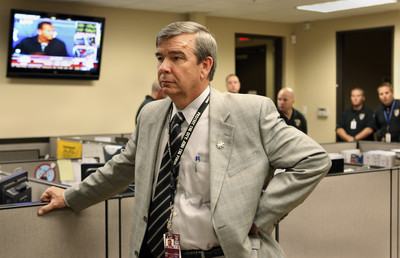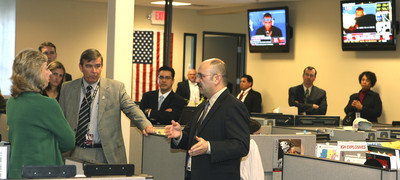Clark County Sheriff Doug Gillespie relishes challenges of job halfway through first term
In late 2005, just before leaving town for the holidays, then-Undersheriff Doug Gillespie sat down to lunch with Clark County Sheriff Bill Young.
Their conversation would change Gillespie's life.
Three years into his first four-year term, Young, whose mother had recently died, was considering not seeking re-election. He wanted to know if Gillespie would run instead. Gillespie, floored, had never seriously considered a bid.
"He still laughs at the 'deer in the headlights' look I gave him," Gillespie said.
Halfway through his term, Gillespie has changed little in terms of policy for the Metropolitan Police Department and has kept a lower profile than his predecessor. Yet by certain measures, his first two years have been a success. Crime overall is down, and his watch so far has been without a major crisis.
The job "flat wore me out," Young said, but Gillespie is enjoying it so much he plans to seek a second term in 2010.
"I've said this many times. ... I still believe that Doug Gillespie could be, and will be, a better sheriff than I was. And I think he's proving that," Young said.
ON THE JOB
At about 9:30 a.m. on a Tuesday in February, Gillespie was in the passenger's seat of an unmarked Ford Crown Victoria on Interstate 15, dressed in a suit and tie.
In his lap was a list of people to call. Three were officers who were placed on leave after shooting and killing a man over the weekend.
Gillespie dialed them up one at a time and made small talk.
"You're a woodworker?" he asked one officer in his deep, New York-accented voice. "You know who else is a woodworker? Jerry Keller."
Keller preceded Young as sheriff.
Gillespie apologized for not seeing the officers over the weekend. He was on vacation, camping in a trailer with his wife. He told them they could call him any time: at home, on his cell, at his office.
They need to feel reassured, Gillespie said. The officers can't return to duty until after the coroner's inquest into the shooting, which could be more than a month away. The fatal shooting was likely the most traumatic incident of their careers.
"Some of them don't have a lot of family support," Gillespie said later. "I think it's important that nobody thinks they're out on an island by themselves."
An island is what the sheriff's job can seem to be, however. The $143,000 annual salary, dictated by the Legislature, is less than he earned as an undersheriff. He's also had to learn how to balance the needs of his officers with the needs of the public and politicians.
"The biggest part of the learning curve is that you're the sheriff," he said. "The title, it means something. When I say 'rain,' people in the department hear 'monsoon.'"
Gillespie, 50, moved 29 years ago from a small town near Poughkeepsie, N.Y., to join the Las Vegas police, starting as a beat officer and working his way up.
He spent four years as an undersheriff for Young, watching him carry out the responsibilities of a job that many consider thankless. Young said he stressed to Gillespie, who has two grown daughters, the need to pace himself and look out for himself, "because nobody else really will."
"There will always be someone calling and asking for something or looking for something," Young said. "One thing you've got to learn is to say 'No.'"
And the hours ... . Gillespie, who had the reputation for working long hours long before he became sheriff, sleeps just a few hours each night. E-mailing at 4:30 in the morning is not uncommon.
"This guy would always come in early and always be the last one to leave, even when he was captain," said officer Laurie Bisch, who ran against Gillespie for the sheriff's post and ended up endorsing him.
His public persona has been markedly different from Young's brand of candor. Young consistently spoke his mind and tended to shoot from the hip, sometimes to his detriment.
Gillespie won't wow you in a speech or news conference, but he gives a balanced, honest impression when he speaks.
"He's lower profile, and a little more low key, and doesn't get as emotionally charged up," Young said.
Gary Peck, president of the American Civil Liberties Union of Nevada and a frequent critic of the department, said he doesn't like to deal in personalities but has noticed a difference between Gillespie and sheriffs past.
"He strikes me as being a highly professional, by the books, buttoned-down kind of guy," Peck said. "What you see with Doug is what you get."
INSIDE THE FORCE
Gillespie starts some days by showing up unannounced at the 6:30 a.m. meetings at various area commands. There, he can hear what crimes are plaguing the area and respond to officers' concerns.
During a February briefing at the Northwest Area Command, on Cheyenne Avenue near the Las Vegas Beltway, one officer voiced concerns about a proposal to change the shift times. Gillespie confirmed that the department was looking into it.
Another asked about the status of the sergeants' exam, and if budget cuts would force the test to be offered every two years instead of every year. Gillespie said he would look into it and get an answer.
The days of the popular sheriff who has the unequivocal support of the troops are probably over in Clark County, according to Detective Chris Collins, president of the Las Vegas Police Protective Association, the union that represents the department's more than 2,500 officers.
The department is too big and the city too large for one sheriff to please everybody.
"He's 50-50 on any given day, which I think is pretty good," Collins said of Gillespie's standing with his officers.
Gillespie was not the first choice of officers when he ran for the post in 2006. The union's ballot results showed support instead for retired Deputy Chief Bill Conger. But Collins said the number of ballots cast was too low to be statistically significant, and the union's board of directors decided to endorse Gillespie because he had a better interview and a better plan for the department's future.
Since he was elected, some of Gillespie's proposals have landed him in hot water with the rank and file.
One proposal, that every officer be required to wear a bulletproof vest, was undoubtedly in officers' best interests. But Collins said reaction was negative, despite the fact that the vast majority of officers wear the vests anyway.
"It was just simply the fact that they didn't want to be told they had to wear them," Collins said. Gillespie dropped the proposal.
He hasn't made sweeping departmental changes, but has tried to make internal openness and communication the hallmark of his administration.
"I think open dialogue and fostering ideas is the key to success," Gillespie said. "And that's what I bring to the table."
He has instituted "shop talk" sessions, where anybody in the department can make suggestions. They've yielded some ideas that led to positive results. The idea last year to have officers patrol the freeways during morning commutes helped reduce traffic fatalities by 15 percent last year, he said.
Yet some are critical that the information from those sessions gets filtered by others in the sheriff's office before reaching his desk.
"If there's one common complaint, it's that communication doesn't flow up like he would like to think it does," Collins said.
Bisch, who said she will run against Gillespie in 2010, said she feels she could do a better job motivating the department.
When dealing with those outside law enforcement, Gillespie has won the respect of some department critics.
Andrea Beckman, who runs the Citizen Review Board, an independent volunteer entity that reviews complaints of misconduct by officers, said Gillespie has been open to change and suggestions.
"Even in the times he hasn't agreed with me, he's taken the time to sit down with me and explain why," Beckman said. "I think he's done a very good job in a very tough time."
Peck, who has sparred with the department over issues such as its policies on the use of Tasers and its resistance to changing the coroner's inquest program, said he would like to see Gillespie go even further.
"He has a willingness to reach out to and listen to members of the community, even the department's critics," Peck said. "But I'm just sometimes frustrated by what it seems to me to be a sort of inability or unwillingness to hear what people are actually saying ... and being open to making change accordingly."
SUCCESS BY THE NUMBERS
The most objective measure of Gillespie's term is in the numbers.
One category that plagued Young's regime, automobile thefts, fell a remarkable 41 percent in the first two years of Gillespie's tenure.
Traffic fatalities are down 30 percent since 2006. Robberies are down 13 percent and homicides 16 percent during the same period.
Burglaries are up slightly, at a much slower pace than during Young's term.
Gillespie has benefited from an influx of hundreds of new officers hired through the More Cops initiative adopted in 2005, an idea that Young was able to win public support for in his term. Some units, such as automobile thefts, also have been given generous budgets to get the job done.
"I'm not pro-Doug or anti-Doug," Collins said, "but he has given the troops the tools they need to do their jobs."
Issues that Gillespie faces in his next two years are the opposite of those that confronted Young. Instead of fighting crime in a city with meteoric growth and increasing revenue, Gillespie is grappling with a department that has a stagnant budget, unfilled civilian positions and possible future pay cuts for officers.
That's on top of whatever effect the worsening economy might have on the crime rate. Homicides this year are already on pace to surpass those in the last two years.
"We have been asked across the board to do more with less," Bisch said.
Collins insists that union polls have shown that Gillespie has upwards of 80 percent of the public's support, which contributes to an equally positive perception of the department.
"He certainly hasn't done anything negative," Collins said. "I think he's very popular with the public."
Gillespie is quick to pass on the credit for successes the department has seen in recent years. He said they're the product of the men and women in the department. Nor will he blame any near-term crime increases on the poor economy.
He decided early in his term that there would be two reasons why he wouldn't run for a second term: his health and his family. And neither of them have been a factor so far.
"You've got to want to continue," Gillespie said. "The internal flame has to still be burning, and it still is."
Contact Lawrence Mower at lmower @reviewjournal.com or 702-383-0440.
SLIDESHOW


















